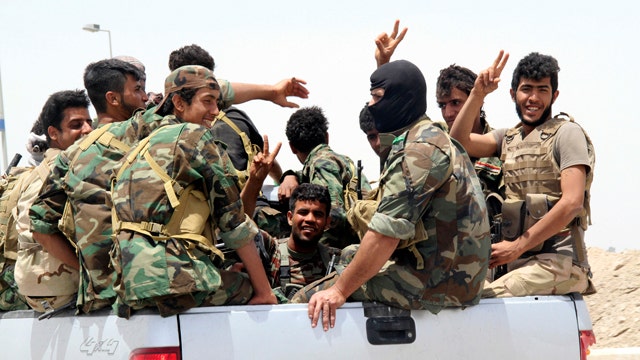Can the US trust Iraqi forces to defeat ISIS?
Lt. Col. Tony Shaffer and Scott Stewart on what's needed to push back the terror group
As Iraqi-led forces launch a new operation to retake Ramadi from ISIS, there are growing concerns the terror group will try to play up sectarian divisions already believed to be widespread within their military.
Iraq’s withdrawal from Ramadi earlier this month surprised some foreign policy analysts. Since Baghdad has a much larger force against the terrorists, many questioned Baghdad’s battlefield strategy.
This disapproval led to calls like the one from Defense Secretary Ash Carter, who said the Iraqis had “no will to fight.”
Army Lt. Col. Tony Shaffer (Ret.) told FoxNews.com he spoke recently with U.S. military trainers advising Iraqi forces and said the picture on the ground isn’t good. “Unfortunately for us, the Iraqi Army that exists today was designed to support and protect an Iraq that no longer exists … unless you know how to lead and be effective, you can outnumber them 10 to 1 – it’s not going to work.”
Still, Scott Stewart, vice president of tactical analysis at the geopolitical intelligence firm Stratfor, believes some Iraqi units, like the ‘Golden Division’ are working. “They have acquitted themselves quite well, as have the police special forces … but they are very few and far between. They’ve been pushed very hard, and while they have been successful at combating ISIS in these areas,” there aren’t many to be an overall effective force.
Both believe regaining Sunni trust in Iraq’s government and military forces is the only way to push back against ISIS.
“We are not going to see any major break in these heavily Sunni areas in Iraq until the U.S. is able to get the Sunnis back on board. And that is also going to involve some arm-twisting on the Shia leadership in order for them to give a little bit to the Sunnis,” said Stewart.
Shaffer says this type of division is tearing the Iraqi military apart. “On a daily basis, instead of training these troops to fight ISIS, they [U.S. advisers] would referee between the Sunni and Shia elements who wanted to fight one another within the army.”
This type of mistrust within the Iraqi military is partially blamed on former Iraqi Prime Minister Nouri al-Maliki and his administration.
“What we saw was the Maliki government eviscerate the leadership of the Iraqi Army. When they continue with these anti-Sunni pogroms to get rid of … these people, it made it very difficult to keep any sort of cohesion,” said Stewart.
Iran’s influence over Iraq is also of concern for the Sunnis. “Right now, that’s one of the reasons the Sunni aren’t trusting the Iraqi Army -- because they see Baghdad as a satellite of Iran and the Shia,” said Shaffer, senior fellow with the London Center for Policy Research.
He added, “I think you can actually make the problem worse by allowing [Shiite] militia … coming in to try and retake Ramadi, then when it's retaken, we’re going to have equal problems if it’s the Shia who hold it and the Sunni will not get on board.”









































